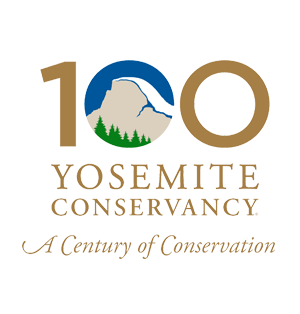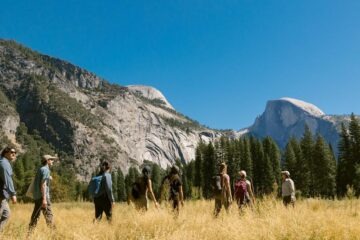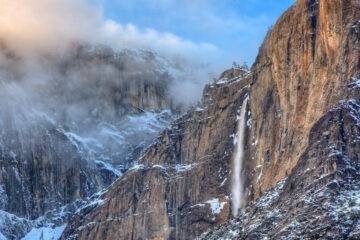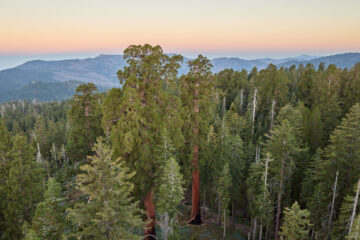By Dan Webster
Photo credit: Keith Walklet
Imagine a tranquil afternoon in Yosemite. Imagine yourself slowly exploring this slice of paradise, using your senses to fully experience where you are.
You feel the texture of the air, the sunlight on your face. What do you hear? Birdsong? The river or waterfall? The music of wind through nearby trees? Perhaps you gaze into the serene stillness of a vast basin or over the tranquility of a shimmering meadow. Your fingertips trace the bark of a large pine tree and you notice the intricate “puzzle piece” designs; you marvel over the colorful lichens living there.
You are forest bathing!
Forest bathing is a nature-appreciation approach that melds mindfulness and nature immersion. It is a process of slowing down and paying close attention to our immediate surroundings. We mindfully explore using all our senses.
The practice has origins in 1980s Japan, where it was developed as an antidote for an overly stressed population. The Japanese Ministry of Agriculture, Forestry, and Fisheries coined the term shinrin-yoku, which roughly translates as immersive bathing in the environment of the forest.
Forest bathing has been shown to reduce anxiety and depression, lower blood pressure and cortisol levels, and enhance cognitive function and feelings of connection and harmony. Further, antimicrobial compounds emitted by trees improve our own immune system — think of the invigorating smell of a mature conifer forest! Breathing in these organic compounds stimulates white blood cell and natural killer (NK) cell production, which helps fight off infections and disease.
In Mountain Thoughts, John Muir wrote: “The sun shines not on us, but in us. The rivers flow not past, but through us, thrilling, tingling, vibrating every fiber and cell of the substance of our bodies, making them glide and sing. The trees wave, and the flowers bloom in our bodies as well as our souls …”
This is the essence of forest bathing: becoming fully entwined with nature, rather than simply observing it as a detached spectator.
Only very recently in human history have we lived so separately from what has been referred to as the “more-than-human world,” resulting in a perceived disconnection from nature. In fact, we are fully natural beings, brought not into the world, but from it. We are to the earth as a wave is to the ocean, as a leaf is to a tree. Time spent outdoors heals the scars of separateness. We may feel joy in our connection, gratitude for the gifts of nature, and ultimately, a desire for reciprocity.
In her powerful book, Braiding Sweetgrass, Robin Wall Kimmerer writes that reciprocity imbues us with the desire “… to take care of the land as if our lives, both material and spiritual, depended on it.”
Imagine a panacea to our busy lives, full of schedules, appointments, stress, to-do lists. Forest bathing invites us to come out and play, to be curious, to engage in a deeper relationship with the land we already know and love. To fully immerse and be whole.
Learn more and get in touch with your senses at our forest bathing program or our other outdoor adventures.



